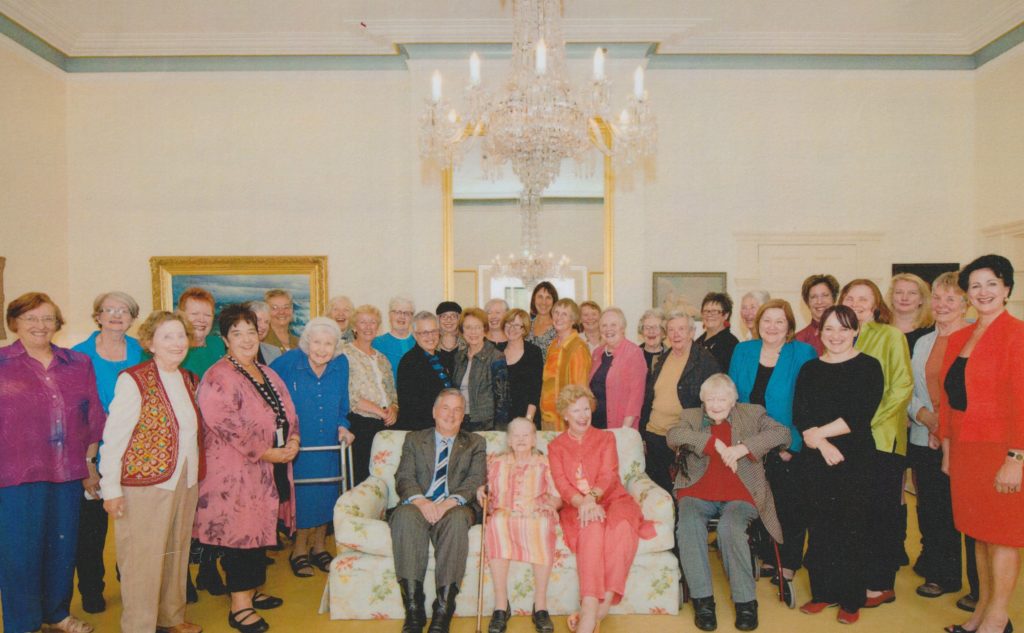We understand our history, in order to create our future.
The Women’s Electoral Lobby South Australia (WEL SA) was formed in Adelaide in July 1972 by the late Dr. Deborah McCulloch AM, who hosted a meeting of non-party political feminist activists determined to change social attitudes and practices that discriminated against women.
Their plan was to influence the upcoming federal election so that the best outcomes for women could be achieved. They aimed to make elected and aspiring parliamentary representatives aware of the views and needs of women voters, and to inform women voters of political candidates’ attitudes to women’s issues.
WEL SA members interviewed candidates and, 2 weeks before the election, published the survey results in major newspapers as an Election Guide, showing individual candidates rated according to their views on 14 key questions. The slogan: “Think WEL Before You Vote!” was adopted. There is no doubt that women’s votes played a vital role in the election of the reformist Whitlam Government.
Action groups formed to lobby Federal, State and Local Governments. WEL SA’s accurate, well-argued submissions formed the basis of State Departments’ writing of legislation. Being able to shape the political agenda was very exciting. Submissions and hundreds of individual letters were written about a huge range of sexism and discriminatory practices in industry, government, and the media.
Following the 1975 United Nations International Year for Women, WEL SA successfully advocated for major structural, cultural, and systemic changes. A Women’s Adviser to the Premier was appointed and the Sex Discrimination Act and the Equal Opportunity Act were legislated.
WEL SA’s efforts achieved the establishment of the following services for women in 1976: Women’s Emergency Shelters; the Rape Crisis Centre; the Women’s Information Switchboard – later known as Women’s information Service; the Working Women’s Centre; Women’s Community Health Centres; the St. Peters Women’s Centre – now named the Women’s Community Centre; and the Women’s Studies Resource Centre. After a long campaign, the Pregnancy Advisory Centre was established in 1992, and the Federal Government funded the Women’s Legal Service in 1995.
Our history shows that social attitudes, policies, and practices that discriminate against women, or trivialise and dismiss women’s efforts, hopes and concerns, can actually fuel the determination to unite and fight for a fairer and more equal share of power in society. Our successes prove that women coming together on a non-partisan basis can be powerful and effective.
WEL SA has been re-vitalised, as we aim to influence the upcoming State and Federal elections so that the best outcomes for women can be achieved. We are fulfilling the prophetic words of our founders 50 years ago: ‘We are here to stay’, and we are saying to South Australian women, come join us and
“THINK WEL BEFORE YOU VOTE!”
Our forty year celebration photo, taken at Government House, on the 2nd of November, 2012.

Those in attendance were: Rear admiral Kevin Scarce, Ms Irene Leighton, Mrs Liz Carce, Mrs Betty Fisher, Ms Penley Atwood, Hon Lyn Breur MP, Mrs Heather Southcott AM, Hon Diana Laidlaw AM, Ms Sandra Dunn, Hon Anne Levy AO, Ms Faye Donaghy, Hon Sandra Kanck, Hon Jennifer Cashmore, Ms Erica Jolly, Hon Step Key MP, Ms Rhiannon Burner, Ms Marylin Rolls, Ms Shirley Stott Despoya, Ms Glenys Jones, Ms Jayne Taylor, Ms Joan Russell, Ms Carol Treloar, Hon Dr Rosemary Crowley, Hon Robyn Layton QC, Ms Yvonne Allen, Ms Janet Skewes, Ms Margaret Messenger, Ms Heather Crosby, Ms Felicity Lord, Ms Deborah McCulloch AM, Hon Gail Gago MLC, Ms Roseanne De Bats, Hon Tammy Franks MLC, Ms Liz Ahern, Ms Vickie Chapman MP.
This is a growing resource. We have a number of paper based archives and will continue to grow this page to highlight the history of The Women’s Electoral Lobby in South Australia.
please click on this link :
We acknowledge Traditional Owners of Country throughout South Australia and pay respect to the past, present and future Traditional Custodians. We acknowledge the importance of the continuation of cultural and spiritual practices of Traditional Custodians and that sovereignty was not ceded. This always was and always will be Aboriginal land.